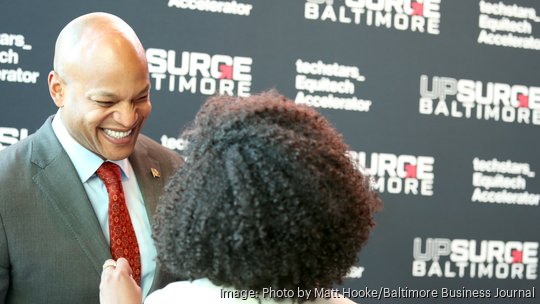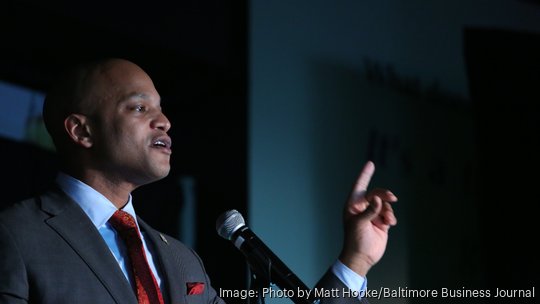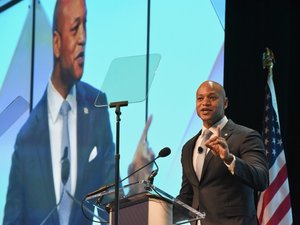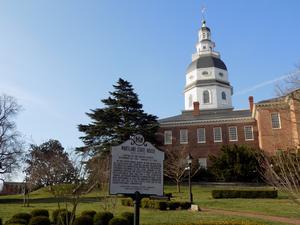
Maryland should see a boost in direct public funding toward manufacturing and lab space later this year as Gov. Wes Moore said he plans to sign a bill that will help build out the state's science and technology industries through a new fund.
Prior to his keynote speech at the TechStars Equitech Demo Day this week, Moore said he planned to sign Senate Bill 549, or House Bill 552, "as soon as it's on my desk," which would authorize the creation of the "Build Our Future" grant program to fund infrastructure projects in a variety of technological fields.
The legislation passed the state Senate and House of Delegates with overwhelming majorities and now awaits Moore's signature. When the governor signs the bill, it'll authorize the creation of the fund to take effect on July 1 and will remain active for at least another four years.
The grant program can fund infrastructure in a variety of fields, from manufacturing, artificial intelligence, cybersecurity, defense, life sciences and more. Examples of eligible projects include wet laboratories, research facilities that handle chemicals or other potentially "wet" hazards.
The legislation is one of 10 bills the Moore administration has proposed to boost the economy by advancing Maryland’s technology sector, adding more green energy companies, increasing wages and other changes. During his Tuesday speech, Moore spoke about the importance of using the state government to make it easier for small businesses to get funding, especially since minority entrepreneurs often don’t have the same access to private capital as white founders.
“If you can get the seed capital, and have the opportunity to turn an idea into something that actually has a sustainable business model, then more capital will follow,” Moore said.

The main difference between the proposed grant program and Maryland's existing incentives is that most of the state's current programs are loans, not grants. A shortage of wet lab space is a major bottleneck for local life sciences companies, which makes it harder to retain companies as they grow. UpSurge Baltimore reported that health care companies made up 37% of Baltimore’s startups in 2022, raising $438 million in venture capital dollars in 2022. For Baltimore to keep up that momentum, it needs the additional lab space so companies can remain in the area as they grow and raise larger and larger funding rounds.
“The pipeline of startups out of Johns Hopkins, for example, is very reliant on wet lab space, for which supply is lacking, and I am hopeful that this bill will help Maryland grow, retain and attract young companies that will be the big employers of tomorrow,” Executive Director of Johns Hopkins Technology Ventures Christy Wyskiel said.
The grant program can be especially beneficial for smaller manufacturers who cannot afford to automate their assembly lines, Early Charm CEO Ken Malone said. He praised how the bill gives businesses a wide amount of freedom in how to invest the grant money.
"It's trying to help businesses transition from being a mom-and-pop operation with a nice cash flow to a serious employer in the city," Malone said.
There are some restrictions to the money. For a grant award of less than $1 million, the recipient must provide matching funds that are at least twice the grant amount. For a grant above $1 million, a company must provide four times the grant award in funding. No more than 50% of the grants in any year can go to universities, and university projects must be performed with private partners, or offer significant impact to develop entrepreneurship or technological innovation.
If a grantee fails to comply with reporting requirements, or misuses the grant, the state can ask for the money back.
“You want to incentivize all forms of capital in order to incentivize entrepreneurship in order to make us more competitive,” Moore said. “I think there's a whole lot more that government can be doing, but I also know that the top innovation and the top thinkers are not going to come from government alone.”









